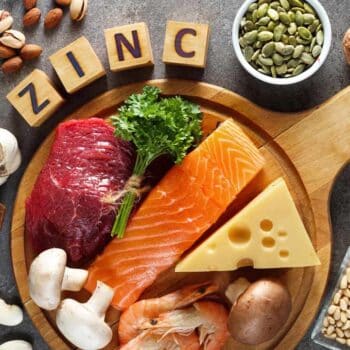How Does Low Zinc Affect Physical and Mental Health?
Zinc deficiency can be caused by multiple factors. One form of zinc deficiency is called acrodermatitis enteropathica, a rare and inherited condition related to the body’s inability to absorb zinc properly. A more common zinc deficiency occurs from dietary limitations. As many as 2 billion across the world suffer from zinc deficiency because of food sources and diets that lack zinc as a component. It is estimated that 450,000 deaths occur annually in children under the age of five because of zinc deficiency.
Zinc is a critical micronutrient for proper cellular metabolism, playing a crucial role in many cellular processes including growth, development, immune systems, neurotransmitters, vision, and reproductive systems. There are three primary functions that zinc serves within the cell. More than 40 enzymes rely on zinc to perform their necessary chemical reactions. Zinc serves as a stabilizing factor in protein structure inside the cell. And, zinc helps to regulate cell functions for proper activity, especially related to gene expression and hormone release.
When zinc levels are too low, a number of health concerns may develop. These include:
- Pregnancy complications
- Growth retardation
- Impaired immune system
- Developmental delays in young children
In addition to these physical health considerations, low zinc correlates to multiple mental health concerns. These related diagnoses include:
- Attention Deficit Hyperactivity Disorder (ADHD)
- Anorexia
- Anxiety disorders
Accordingly, it is important to guard against these potential outcomes by ensuring proper zinc levels in the body. Zinc supplements have been effective in reducing some ADHD symptoms by themselves and may improve the effectiveness of other medications designed to treat ADHD. Additionally, clinicians have seen improvements in anorexia as well as fewer cases of relapse in patients with higher levels of zinc.
What Factors Affect My Zinc Deficiency?
There are several conditions that can contribute to zinc deficiency. Puberty presents a susceptible time for zinc deficiency. The high demands for growth during puberty require additional levels of zinc. When zinc is not replaced through diet or supplements, the stores of zinc in the body are depleted.
Stress increases the body’s demand for zinc, which must be replaced. When zinc intake does not restore levels of this micronutrient, the body does not respond well to stressful conditions. Accordingly, chronic stress will likely use up zinc stores, leading to further anxiety and additional added stress, creating a cycle of zinc deficiency until it can be restored.
Vegetarianism has the potential to cause a zinc deficiency because meat is a primary source of zinc in the Western diet. Over half of Americans’ zinc intake comes from animals, especially red meat. Vegetarians should pay careful attention to zinc levels and take steps to supplement their diet to accommodate this deficiency.
Environmental factors also contribute to zinc deficiency. Though more and more people are aware of its dangers, bisphenol A (BPA) is a chemical component of many hard plastics and can liners. BPA binds to zinc and can prevent our ability to absorb this important mineral. Accordingly, we should choose BPA-free products whenever possible.
The above causes for zinc deficiency are by no means comprehensive. These elements represent some of the more obvious contributors to low zinc levels. At Bridgepoint Clinics, we always investigate each individual client for insight into his or her unique situation. Every person is different, and we are prepared to work with you to help uncover the true source of your condition.
How can I Add Zinc to My Diet?
Certain foods provide a reliable source of natural zinc. These include meat, eggs, and seafood. Other foods, such as grains and legumes, have high phytate content, which hinders zinc absorption. A proper balance of these foods is a start to a healthy diet for zinc bioavailability.
For many reasons, sometimes diet cannot supply adequate levels of zinc. We look forward to investigating your diet and determining when supplements are appropriate for you – and what supplements will be most effective for your body.
How Can Bridgepoint Clinic Help?
At Bridgepoint Clinic, our goal is to help you achieve a healthy, wholesome life with as much “normalcy” as realistically possible. In many cases, we are able to help restore patients to a completely normal life despite their perceived limitations.
Our staff is highly trained with experience to identify the true root cause of your concern. When this diagnosis includes a deficiency in zinc, our team has the knowledge to guide you through a healing process and prepare you for a healthier lifestyle.
Whether your symptoms are physical or mental – or a combination of the two – we stand ready to assist your condition and restore you to a happy and productive state of strength. Contact us today to begin your healing process.
Resources:
https://lpi.oregonstate.edu/mic/minerals/zinc
https://www.psychiatryredefined.org/zinc-an-essential-element-in-the-fight-against-anorexia/
https://www.mensahmedical.com/zinc-deficiency-and-anxiety/
https://isom.ca/article/micronutrient-deficiencies-adhd-global-research-consensus/
<<Back to Micronutrient Center


